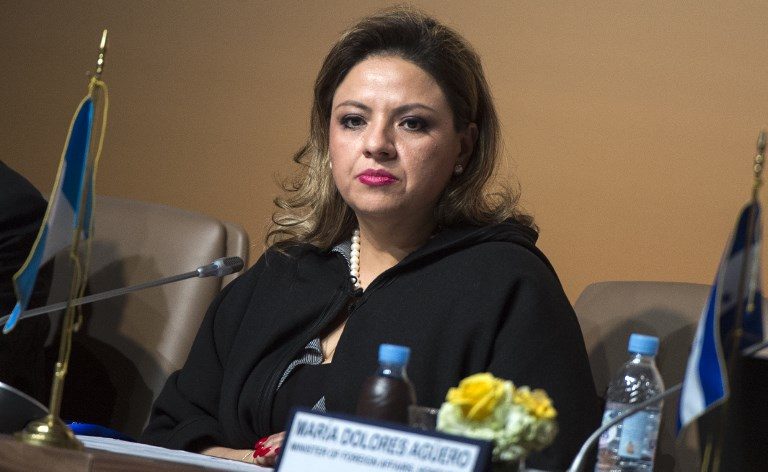SUMMARY
This is AI generated summarization, which may have errors. For context, always refer to the full article.

GUATEMALA CITY, Guatemala – Guatemala brushed aside protests from the United Nations and pressed ahead Tuesday, January 8, with shutting down a UN anti-corruption mission in the Central American country after it began investigating President Jimmy Morales.
The move, communicated on Monday, January 7, to the world body in New York by Guatemalan Foreign Minister Sandra Jovel, has racked up tensions in the country, where civil organizations have threatened anti-government protests.
Jovel gave UN Secretary-General Antonio Guterres 24 hours’ notice on Monday that Morales was terminating the mandate of the International Commission Against Impunity in Guatemala (CICIG).
The UN chief said he “strongly” rejected the decision, insisting the government abide by an international agreement in place since 2007.
Staff of the mission had begun implementing a contingency plan to leave the country, a Commission spokesman said.
“We’ve launched a contingency plan and international personnel have been asked to leave the country until further notice,” said spokesman Matias Ponce.
Images on social media showed vehicles entering the Commission’s headquarters in the capital and leaving with materials and office furniture, while a crowd waved Guatemalan flags and set off firecrackers in celebration.
Army spokesman Oscar Perez said security guards at the headquarters would be asked to hand over their firearms from Wednesday, January 9.
Business leaders and right-wing groups backed Morales’s decision in a statement, slamming the UN mission for “a serious lack of due process” and insisting the move was constitutional.
However, outraged humanitarian, indigenous and university organizations called on the government to reverse the decision.
US Senator Mike Lee, a Republican from Ohio, also came out in support of the decision and slammed “violations” by the CICIG.
“A nation’s sovereignty is the core of its freedom,” Lee said in a tweet. “Guatemala has every right to speak up and defend violations of sovereignty and abuses committed by the International Commission against Impunity in Guatemala.”
The Guatemala Immortal group urged the population to support Morales’s decision, saying the CICIG had been “taking over the justice system.”
Rigoberta Menchu, who won the Nobel Peace Prize in 1992, said Morales’s unilateral decision was “one more sign of progressive institutional breakdown,” as well as of the rule of law.
Menchu praised the work of the UN mission, saying it had “contributed significantly to the fight against corruption and impunity and strengthened the system of justice and democracy in Guatemala.”
Accumulating tension
Guatemalan officials sought to bar a Colombian investigator for the mission from entering the country over the weekend, and had a lengthy confrontation with the mission leader, Colombian prosecutor Ivan Velasquez, who Morales has repeatedly tried to expel from the country.
The commission has typically gone after high-level officials and corporate executives, including Morales’s son and brother, who were charged with tax evasion and money laundering in 2016.
The situation worsened in August 2017, when the CICIG began investigating Morales himself for corruption, involving his party’s campaign finances when he won the presidency in 2015.
At a news conference in New York late Monday, Jovel accused the commission of “interference” and said Guatemala was defending its sovereignty by scrapping the investigative body.
However, Guatemala’s ombudsman Jordan Rodas said the decision violated international treaties and lodged an appeal with the country’s Constitutional Court, which had originally endorsed the mission.
Rodas said Morales’s actions were an attack on democracy and the fight against corruption.
Erika Guevara-Rosas, Amnesty International’s Americas director, said the move was “the latest blow to the fight against impunity and clearly shows its worrying lack of willingness to work toward an independent justice system that guarantees the rights of all people in Guatemala.” – Rappler.com
Add a comment
How does this make you feel?
There are no comments yet. Add your comment to start the conversation.